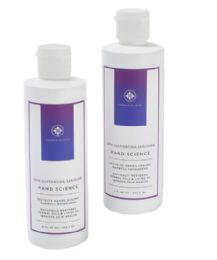
Hand sanitizer, also known as hand antiseptic, is a hand cleaning supplement or alternative to using soap and water. Most hand sanitizers kill 99.9% of bacteria present by using active ingredients such as isopropyl alcohol, ethanol, povidone-iodine, or propanol, and can come in a base-formula consisting of foam, gel, or liquid, and are often used by medical personnel and the general population for personal hygienic sanitation.

.jpg&newheight=260&quality=80)
What are Hand Sanitizers?
Used in combination with washing hands with soap and water, hand sanitizers are also often utilized as an alternative to washing the hands. Also known as hand antiseptics or disinfectants, most hand sanitizers kill 99.99% of bacteria present on the hands, with hospital-grade versions that are even more highly effective. When used as a supplement to regular hand washing, the combination of both cleansing methods becomes increasingly efficient at removing and preventing the spread of harmful pathogens.
While many hand sanitizers contain ethyl alcohol (ethanol) to eliminate microorganisms, there are also alcohol-free mixtures that may contain povodone iodine, benzalkonium chloride or triclosan, which are all efficacious sanitizers, as well. Other ingredients may include thickening agents like polyacrylic acid for a gel-like consistency, plant essential oils for aroma, and humectants and emollients for moisturizing. Hand sanitizers work without the use of water to clean the hands.
Hand sanitizers are also available in fragrance-free versions, and most are compatible with the use of gloves, whether they’re latex, nitrile or vinyl, with or without powder. They are most commonly available as liquids, gels and foams. Often designed with a no-touch feature, dispensers for hand sanitizers can be large and wall-mounted for facility usage, or as small as pocket-size for handy personal travel. They are also available as disposable hand wipes.
The Benefits of Hand Sanitizers
While most experts agree that thoroughly washing the hands with soap and very warm water is the most effective way to kill germs, this activity is not always available or feasible. Hand sanitizing products can help pick up the slack of being unable to wash the hands, and keep the hands as germ-free as possible. They are wonderful to take along when traveling, on the road, or anywhere where it may be difficult to wash the hands in the regular way with soap and water.
Hand sanitizers tend to be quite sufficient at killing most harmful pathogens, including stubborn microorganisms and antibiotic-resistant bacteria. MRSA, VRE and E.Coli all succumb to most hand sanitizers, but it is important to note that norovirus, which often causes digestive and intestinal flu distress, is not usually killed through the use of alcohol-based hand sanitizers (although hand sanitizers that use benzalkonium chloride ARE effective against norovirus). Because norovirus is effectively killed through regular hand washing, it is always recommended to engage in both hand washing and the use of hand sanitizers to achieve the highest broad spectrum kill rate.
While hand sanitizers will not work very well when there is still visible dirt or grime on the hands, using them is better than using nothing at all. They will still retain some effectiveness at eliminating harmful microorganisms. When combined with proper hand washing techniques, most hand sanitizers are able to kill fungi, bacteria and many viruses. Several brands that Rehabmart offers also conform to CDC, AORN, APTC, FDA and WHO guidelines and suggestions for hygienic hand sanitation protocols.
Proper Hand Sanitation Techniques
The absolute best way to keep the hands clean and free of harmful pathogens is to properly wash them with soap and water, and to supplement this activity with applying a hand sanitizer product.
The best way to wash the hands is to wet them with clean running water (preferably warm) and apply soap. Rub the hands together vigorously to make a soapy lather and scrub them well. Pay special attention to areas between the fingers, under the nails, and the backs of the hands. It is important to scrub or rub for at least 20 seconds, then rinse the hands thoroughly under clean running water. Follow up by drying the hands with a clean towel, or an air dryer.
The best way to apply a hand sanitizer is to apply enough of the product into your hand to completely wet both hands. Rub the hands together with the sanitizer until both hands feel dry. Be sure to get the product between all of the fingers, under and around the nails, and up into the wrist and lower forearm for the highest antimicrobial effectiveness.
While those who work in hospitals, long-term care facilities, clinical and medical settings and any type of foodservice or restaurant occupations are typically trained about the importance of keeping the hands clean and when to wash and/or sanitize them, most of us could use some reminders.
To help stop the spread of germs and harmful microorganisms, it is important to wash the hands and/or sanitize them BEFORE:
*Eating
*Preparing Food
*Treating Wounds
*Administering Medicine
*Attending to a Sick or Injured Individual
*Removing or Inserting Contact Lenses
To help stop the spread of germs and harmful microorganisms, it is important to wash the hands and/or sanitize them AFTER:
*Food Preparation (especially poultry and other raw meats)
*Touching an Animal, Animal Toys or Animal Waste
*Administering to a Sick or Injured Individual
*Handling Garbage or Other Soiled Items
*Blowing Your Nose
*Using the Bathroom or Toilet
*Changing a Diaper
Rehabmart is pleased to offer a comprehensive array of highly efficacious hand sanitizers designed for both hospital and personal usage from such esteemed vendors as HandClens, Mada Medical, McKesson Medical-Surgical, Independence Medical, Sammons Preston, and Medline.
Hulet Smith, OT
Rehabmart Co-Founder & CEO
ck